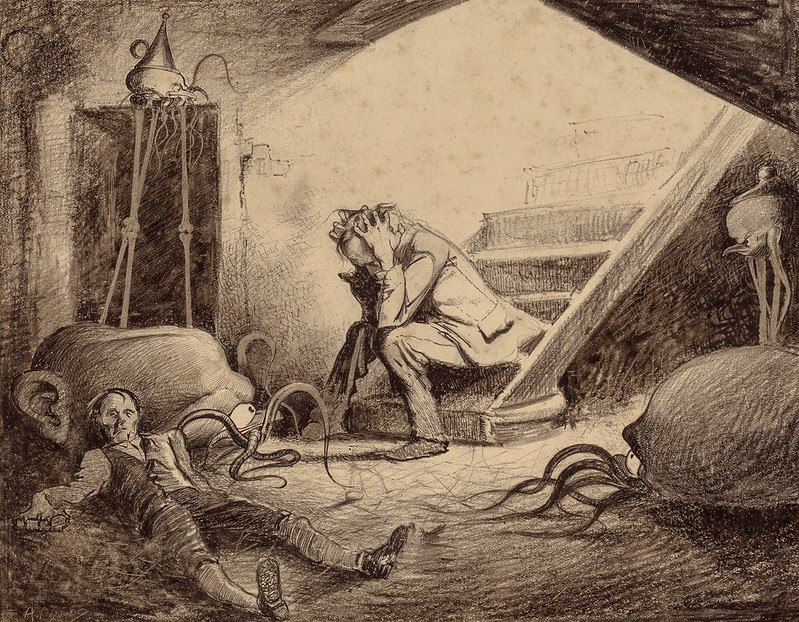Story 5/31
The War of the Worlds
by H.G. Wells
Exploring this story was a bit of a different experience for me this year. It's one of the times I explored the gothic genre's influence in science fiction, and also because I read it from a book instead of just listening to it on librivox.
(an actual book...that I had to hold, with words...that I had to look at...wow!)
In addition to reading it over the summer, I just finished listening to the audio book on librovox. And, I have to say, hearing it a second time has altered my opinion of the main character a bit.
Link: https://librivox.org/war-of-the-worlds-solo-by-h-g-wells/
Quote: “This isn't a war, [...] it never was a war, any more than there's war between man and ants.”
Theme: Imperialism
There are moments of genuine atmospheric fear in this story; the times when the narrator is up-close and personal with the Martians are particularly memorable. However, much of the story is told in past tense: supposedly everyone in his audience is already familiar with "The Great Disillusionment" and he's just telling us about his particular experience.
In that sense, it this story evokes the type of fear Michael Crition books go for. These depictions of human vulnerability and hubris also provide a scientific-type for the predestination and prophecy of the genre's gothic predecessors.
In the radio dramatic adaption, much of the action is happening in "real time". The sensationalism and panic of the event is realized almost immediately. I think this is a compelling way to tell the story.
The book, however, the realization of the onset of the horror is gradual. No one knows what to think of the Martians at first because they're seem very slow, and not too intimidating. Information about the landing travels slowly through the countryside (because they don't have radio ;). It takes time for the natives of Britain to gauge the intentions of the colonizing Martians. This allows for a bit more through examination of human nature and how different people respond to fear..
For much of the story, the Narrator is in 'survival-mode'. He's extremely goal oriented; he's got to get to the town where his wife is and that's the one thing that keeps him going through the tumult.
Even with the benefit of retrospect, he doesn't have a lot of insight into his own state of mind.
"It is a curious thing that I felt angry with my wife; I cannot account for it."
Most of the time he communicates events in a very factual way, without excessive descriptions of the fear and terror he was obviously feeling. It also leads to him being very callous and cold towards other people. I find it ironic that he can point out all the follies of every person he interacted with, but not towards himself.
How this personal tenancy contributed to the escalating tension in in the story became even more evident when I listened to audiobook today:
(From chapter 13)
The Curate: "What does it mean?" What do these things mean? [...]Why are these things permitted? What sins have we done? The morning service was over, I was walking through the roads to clear my brain for the afternoon, and then--fire, earthquake, death! As if it were Sodom and Gomorrah! All our work undone, all the work---- What are these Martians?"
This dude is clearly in a state of complete panic. The narrator is dismissive...
Narrator: "Are we far from Sunbury?"
...and none too sympathetic:
The
Narrator: "Be a man!"
I'm not saying he should have gone all touchy-feely with this guy, but at this point in the story there isn't an imminent threat surrounding these two people. There was time for the narrator to engage this man, assess his psychological state, see if he can be reasoned with, possibly mitigate a lot of the tension that was going on in his mind, and plan...
For the time when there IS an eminent threat...
(Martians are vampires, apparently. Who knew?)
I agree with the narrator when he says that 'this was not a crime' on his part. Because crime is "to forsee and do" but I'm disappointed that he can't recognize his own human vulnerability.
Because in the end, this story is not about facing aliens, it's about people who behave in just the same way as we do. And the fear that someday, someone will do unto us as we have done unto others.


4 comments:
Sounds like a great book! Thanks for following by the way!
You're welcome, I'm enjoying your Hobbit RP blog.
Thanks! If you have any suggestions, I would love to hear them!
Thanks! If you have any suggestions, I would love to hear them!
Post a Comment